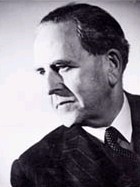Identity Statement for Seán MacEntee
- Reference code: IE UCDA P67
- Title: Papers of Seán MacEntee (1889–1984)
- Dates: 1914–82
- Level of description: Fonds
- Extent: 45 boxes
 Seán MacEntee was born in Belfast and educated at St Mary’s Christian Brothers School, St Malachy’s College and the Belfast Municipal College of Technology where he qualified as an electrical engineer. His early political involvement was with the Irish Socialist Republican Party in the city. He worked as an engineer in Dundalk, County Louth, and was involved in the establishment of a local corps of the Irish Volunteers. He fought in the GPO Garrison in 1916 and was sentenced to death, a sentence commuted to life imprisonment.
Seán MacEntee was born in Belfast and educated at St Mary’s Christian Brothers School, St Malachy’s College and the Belfast Municipal College of Technology where he qualified as an electrical engineer. His early political involvement was with the Irish Socialist Republican Party in the city. He worked as an engineer in Dundalk, County Louth, and was involved in the establishment of a local corps of the Irish Volunteers. He fought in the GPO Garrison in 1916 and was sentenced to death, a sentence commuted to life imprisonment.
He was released in the general amnesty in 1917; elected a member of the National Executives of both Sinn Féin and the Irish Volunteers in October 1917; and elected Sinn Féin MP for South Monaghan in the 1918 general election. An attempt to develop his career as a consulting engineer in Belfast was interrupted by the War of Independence. He served as Vice-Commandant of the Belfast Brigade of the IRA until April 1921 when he was transferred to Dublin to direct a special anti-partition campaign in connection with the May general election.
It was on the partition issue that he voted against the Treaty, regarding the Oath of Allegiance as a much less significant obstacle to a resolution of the conflict. He commanded the IRA unit in Marlboro Street Post Office at the outbreak of the Civil War, fought with Cathal Brugha in the Hamman Hotel, and was interned in Kilmainham and Gormanstown until December 1923.
After his release MacEntee devoted himself more fully to his engineering practice, although he did contest unsuccessfully the County Dublin bye-election of 1924. He was a founder member of Fianna Fáil, was elected TD for County Dublin in the June 1927 general election, and was returned at every subsequent election until 1969, for the County Dublin, Dublin Townships, and Dublin South-East constituencies consecutively.
MacEntee served as Minister for Finance, 1932-39; Industry and Commerce, 1939–41; Local Government and Public health, 1941–48; Finance, 1951–54; Health, 1957–65; Social Welfare, 1957–61; and Tánaiste, 1959–65. Among the highlights of a long and distinguished ministerial career were the Anglo-Irish Financial Agreement, 1938; the Trade Union Act, 1941; the reorganisation of the health services, the establishment of separate departments of health and social welfare, and the fluoridation of water supplies in Ireland.
He was a long-serving member of the Council of State, being first appointed in 1948 and was a member of the first Irish delegation to the Council of Europe in 1949. His published work includes Poems (1918) and Episode at Easter(1966). He married Margaret Browne, a sister of Cardinal Michael Browne and Monsignor Pádraig de Brún, President of University College Galway. She lectured in Irish in UCD. They had three children, one of them the poet, Máire Mac an tSaoi.
This collection was deposited in UCD Archives in May 1984 by MacEntee's daughter, Dr Máire Cruise O'Brien.
Irish Volunteers and Sinn Féin: material relating to Easter 1916 and MacEntee’s activities with the Louth Volunteers, his imprisonment and court martial; membership of Dáil Éireann, opposition to the Treaty and internment during the Civil War.
Minister for Finance (1932–9, 1951–4), Minister for Industry and Commerce (1939–41), Minister for Local Government and Public Health (1941–8), Minister for Health (1957–65) and Minister for Social Welfare (1957–61): material relating to budgets; to the Economic War and Anglo-Irish Conferences, 1932–8; to the 1937 Constitution; to national defence, the Emergency and wartime finance; to partition, Northern Ireland and Anglo-Irish relations; to revolutionary and subversive organisations; to departmental and policy matters such as trade union legislation, banking and monetary policy including the Banking Commission, 1934, and the Central Bank Act, 1942, energy production, electrification, peat production, ministerial pensions and salaries, national health insurance, population and employment, tourism, public and health service reorganisation, fluoridation of water supplies.
Material relating to general election campaigns and referenda, 1918–77, including publicity, speeches, strategy and analysis.
Fianna Fáil, 1926–83: party political and commemorative material; texts of speeches.
Material relating to his membership of the Council of State, 1945–83, and the Council of Europe, 1950–68. Research material and historical enquiries, 1948–62.
Printed matter and press cuttings, 1925–82.